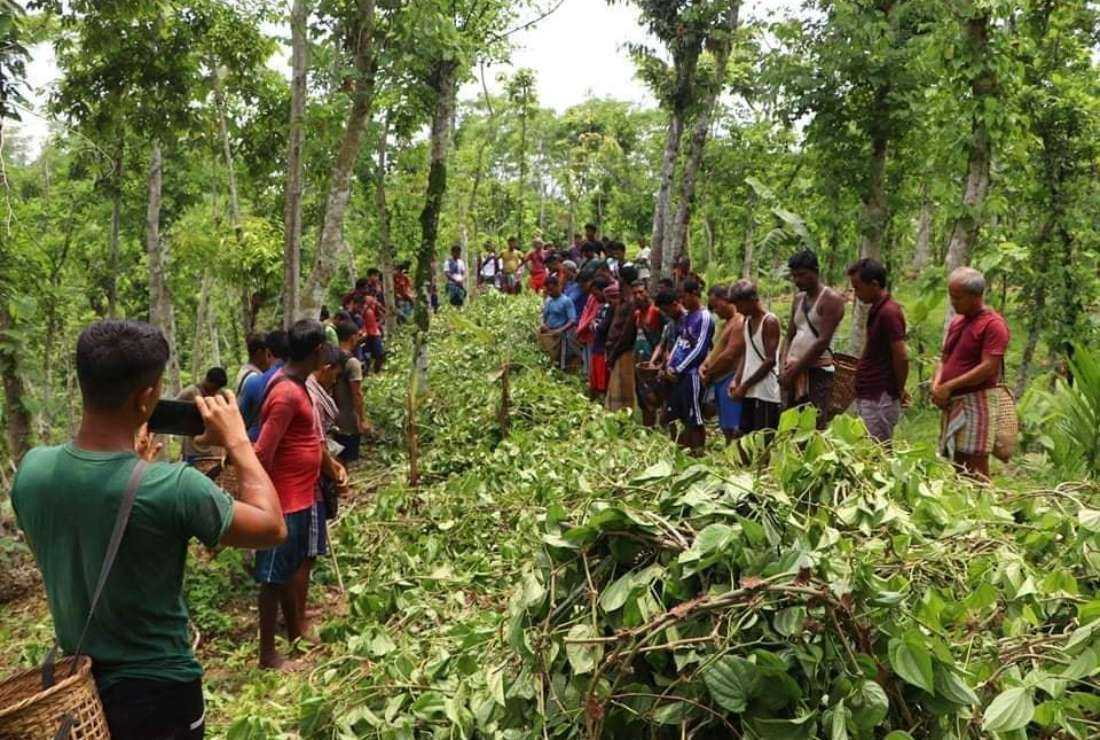
Community accuses tea estate of destroying their plantation as part of a concerted effort to force them from their land

Ethnic Khasi Christians inspect their betel leaf plantation after vandals destroyed many plants and trees in Agar Pan Punji in Moulvibazar district on May 31 last year. A nearby plantation was allegedly attacked on May 8. (Photo supplied)
Ethnic Khasi people in northeast Bangladesh have lodged a police complaint against the management of a tea estate for allegedly destroying a betel leaf plantation, the mainstay of the community, with the purported aim of evicting at least 60 families.
Olmi Potam, 65, a Presbyterian Christian and head of Berenga Khasi Punjee (forested village) filed a written complaint against 10-15 people including Siraj Uddin, manager of the Alladat Tea Garden in Moulvibazar district on May 8.
The move came after 3,000 betel leaf plants and 60 betel nut trees were cut down in the early hours of the same day.
“Our 3,000 betel leaf plants and 60 betel nut trees bearing fruit were cut down by a group of people led by the manager of the Alladat Tea Garden in the morning on May 8, with sharp handmade weapons,” Potam told UCA News.
He said the Khasi people were living in fear as these people had threatened to set fire to their houses to evict them.
“We are losing sleep over this eviction threat,” he added.
Potam said they want justice for the attack and police protection.
Yardous Hasan, officer in-charge of Baralekha police station which covers the area, confirmed receiving the complaint.
“We have received a written complaint regarding the cutting of betel leaf plants and betel nut trees in Berenga Punjee. The matter will be investigated and legal action will be taken,” Hasan told UCA News.
Police officer Hasan said a written complaint is not a criminal case, but it will turn into one if investigations find the allegations credible.
The complaint said that a total of 500 Khasi people belonging to 60 families have been living in the Punjee village for generations and that the damage done was aimed at forcing them out to make way for expansion of tea plantations.
The Khasi people have suffered a loss of around 1.5 million taka (US$14,000), it said.
Alladat Tea Garden manager Siraj Uddin denied the allegations against him and the tea-garden.
“This accusation against us is false, we are not connected to their loss,” Uddin told UCA News.
The Khasi are a matrilineal Mongoloid ethnic group mostly living in Bangladesh and northeast India. There are an estimated 40,000 Khasi in Bangladesh, mostly Christians, inhabiting forested villages and relying largely on betel leaf plantations for their livelihood.
Though the Khasi people have been living in their close-knit villages for generations, the operators of various tea estates and the state-run Forest Department have accused them of occupying land illegally, triggering a slew of eviction attempts and court cases over the last few decades.
Observers said that small ethnic groups like the Khasi suffer due to a lack of special laws to protect their identity and rights, such as customary and community land ownership.
The Khasi people allege that many in their community have been falsely accused of cutting down trees while tea estate operators have destroyed their betel leaf plantations and natural forests.
Last August, an unidentified group allegedly cut down around 2,800 betel leaf plants in a Khasi village and beat up some of the villagers.
Bably Talang, secretary of KUBORAJ, an inter-Khasi village organization, told UCA News that a series of attacks on the Khasi people and the destruction of their livelihoods prove that the attackers were trying to dislodge them.
“If the state does not provide ownership of the tribal lands and allow us to be tortured like this, it is certain that at some point the tribals will not be able to live in these areas and the country, they may have to migrate,” said Talang, a Catholic.
Oblate Father Kajol Linus Gomes, parish priest of the Church of Divine Mercy said the government's failure to recognize the rights of tribal people continues to haunt them.
“It is inhuman that the state does not recognize these people as an indigenous community, so there is no solution. As we have done over the years, we will continue to support the Khasi in their fight for rights morally and financially,” he said.
Help us keep UCA News independent
The Church in Asia needs objective and independent journalism to speak the truth about the Church and the state.
With a network of professionally qualified journalists and editors across Asia, UCA News is just about meeting that need. But professionalism does not come cheap. We depend on you, our readers, to help maintain our independence and seek that truth.
A small donation of US$2 a month would make a big difference in our quest to achieve our goal.

Share your comments